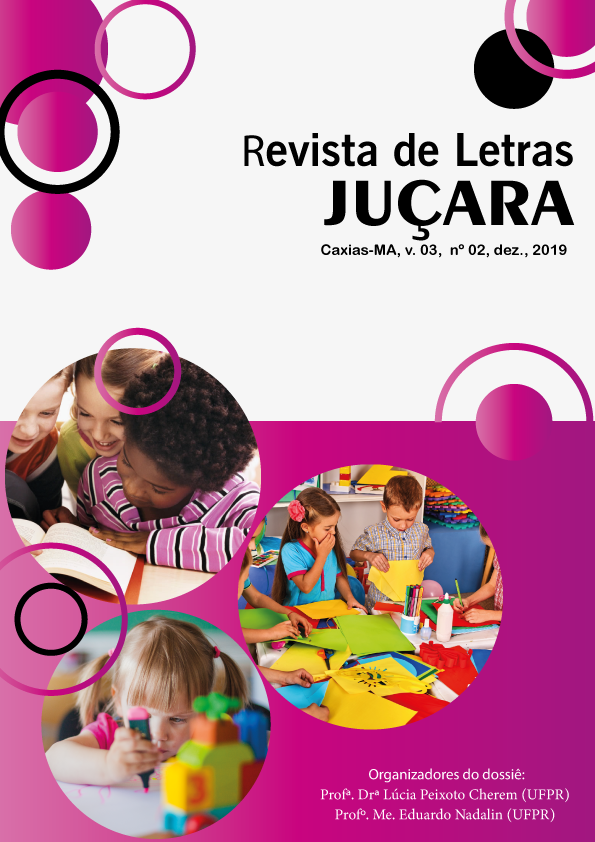BLACKNESS IN SEGREGATION AGE: SEMIOTIC ANALISIS OF MELANCTHA, BY GERTRUDE STEIN
DOI:
https://doi.org/10.18817/rlj.v3i2.2037Abstract
This research result from a project that aims to analyse, on discursive perspective, a novel from Three Lives, by Gertrude Stein, north-american writer. The research objective is to understand how the book separate its characters by their characteristics given to them by their race. The theoretical validity is based by cultural studies dialog, as Woodward (2000) and feminists theories by Bell Hooks (1981;2000) and Angela Davis (1982). To the analysis, we get semiotic theory contribution by Barros (2005) and Fiorin (2008). It privileged the character figure analysis, considering enunciator’s syntactic and semantic resources. Melanctha’s transitory among assumed benefits by her light skin and her constant search for black community’s acceptance where she lives it’s what shows the ethnic limbo, the entre-lugar where she is. As final results, we get that its characters not only had racial stereotypes that reminds from slavery where laws and segregation was built among the citizens, but also used post slavery representation which black people were subject by white population, exposed to insulting and subhuman situations, as horrid as slavery.
References
AGA, Gisele; MARTÍNEZ, Vicente. Time to share, 6. Saraiva: Saraiva, 2015.
BALBINOT, Márcio; RICHTER, Marcos Gustavo. A abordagem comunicativa na aquisição de língua escrita. Linguagem e Cidadania, Curitiba, v. 6, n. 1, p.1-3, 12 jan. 2001. Anual. Disponível em: <http://coral.ufsm.br/lec/02_01/MarcioLC6.htm>. Acesso em: 22 jan. 2018.
BARROSO, T.. Gênero textual como objeto de ensino: uma proposta de didatização de gêneros do argumentar. Signum: Estudos da Linguagem, v. 14, p. 135-156, 2011.
BRASIL. Ministério da Educação. PNLD 2017: língua estrangeira moderna: espanhol (FNDE). Brasília, DF: Ministério da Educação, Secretaria de Educação Básica, 2016.
GEDOZ, Sueli; COSTA-HÜBES, Terezinha da Conceição. Concepção sociointeracionista da linguagem:percurso histórico e contribuições para um novo olhar sobre o texto. Revista Trama (UNIOESTE), v. 8, p. 125-138, 2012.
COSTA-HÜBES, Terezinha da Conceição. Reflexões teórico-metodológicas para o trabalho com os gêneros textuais nas aulas de língua portuguesa. In: V SIGET ? Simpósio Internacional de Estudos de Gêneros Textuais: o ensino em foco., 2009, Caxias do Sul - RS. Anais... SIGET. Caxias do Sul: UCS, 2009. v. 1.
JOUVE, Vicent. Por que estudar literatura? São Paulo: Parábola, 2012.
CELANI, Maria Antonieta. Questões de ética em Linguística Aplicada. Linguagem & Ensino, São Paulo, v. 8, n. 1, 2005, p. 101-112.
MEIRELES, Adélia Deus; CUNHA, Djanira do Espírito Santo Lopes ; MACIEL, Emanoela Moreira . Estudo De Caso Na Pesquisa Qualitativa Em Educação: Uma Metodologia. In: VI Encontro De Pesquisa Em Educação, 2010, Teresina: Edufpi, 2010.
OLIVEIRA, Cristiano Lessa. Um apanhado teórico-conceitual sobre a pesquisa qualitativa: tipos, técnicas e características. Travessias (UNIOESTE), 2009.
SANTOS, Joel Rufino dos. Quem ama literatura não estuda literatura: ensaios indisciplinados. Rio de Janeiro: Rocco, 2008.
SCHNEIDER, Maria Nilse. Abordagens de ensino e aprendizagem de línguas: comunicativa e intercultural. Contingentia, Curitiba, v. 5, n. 1, p.1-6, 28 mar. 2010. Anual. Disponível em: <http://seer.ufrgs.br/contingentia/article/view/13321/7601>. Acesso em: 22 jan. 2018.
TODOROV, Tzvetan. A literatura em perigo. Rio de Janeiro: DIFEL, 2010.
SOARES, Magda Becker. Alfabetização e letramento: caminhos e descaminhos. Pátio, Porto Alegre, v. 8, p. 18-22, 2004.
Downloads
Published
How to Cite
Issue
Section
License
A submissão de originais para a Revista de Letras Juçara implica na transferência, pelos autores, dos direitos de publicação. Os direitos autorais para os artigos publicados nesta revista são do autor, com direitos da revista sobre a primeira publicação. Os autores somente poderão utilizar os mesmos resultados em outras publicações indicando claramente a Revista de Letras Juçara como o meio da publicação original.


